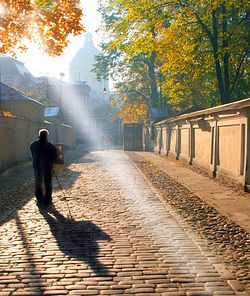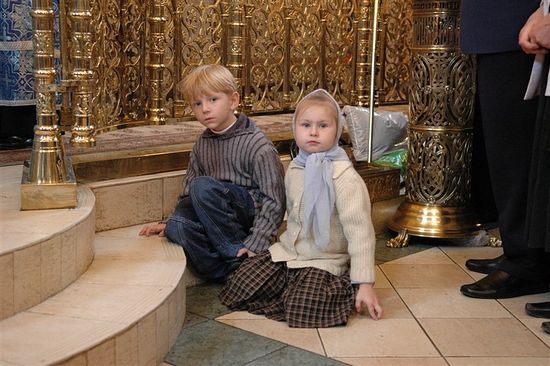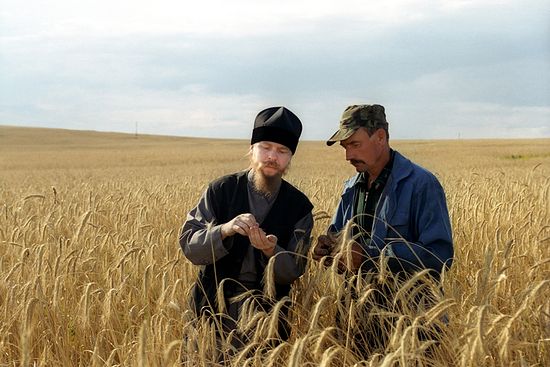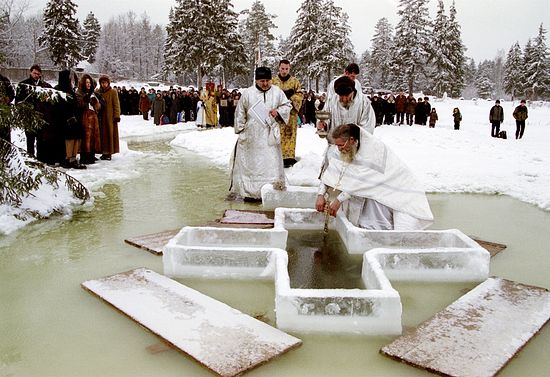“Alright. One has to go to church, but why every Sunday? Do we need to be so fanatical?
 Photo: Y.Kostigov To put it briefly, one has to say that if the Creator commands, His creation has to answer with absolute obedience. The Ruler of all times has given us the days of our life. Is He not allowed to demand from us that we give Him four out of one hundred and sixty-eight hours of the week? Besides, the time we spend in church is for our own benefit. If a doctor prescribes some procedures for us, do not we try to follow all the doctor’s recommendations if we want to get well? Why do we then ignore the words of the Great Physician of souls and bodies?
Photo: Y.Kostigov To put it briefly, one has to say that if the Creator commands, His creation has to answer with absolute obedience. The Ruler of all times has given us the days of our life. Is He not allowed to demand from us that we give Him four out of one hundred and sixty-eight hours of the week? Besides, the time we spend in church is for our own benefit. If a doctor prescribes some procedures for us, do not we try to follow all the doctor’s recommendations if we want to get well? Why do we then ignore the words of the Great Physician of souls and bodies?
Is following the Supreme Will fanatical? According to the dictionary, “fanaticism (from Latin fanaticus—extreme zeal) is a belief or a worldview taken to the extreme, intolerance to other points of view (for example, religious fanaticism).” Here we have to answer the question: What is the extreme degree? If it is something frenzied and ecstatic, then it is very unlikely that the people who go to church every Sunday tend to attack people in ecstatic joy or wrath. Sometimes, adhering to common sense is already considered extreme by some people. If not stealing and not killing is fanaticism then we are definitely fanatics. If the teaching that there is only one true path to one true God is considered fanatical, then we are fanatics. But with such an understanding of fanaticism the Heavenly Kingdom will be inherited only by the fanatics, because all the “normal” and “logical” are destined to the outer darkness, for God says: “ I know thy works, that thou art neither cold nor hot: I would thou wert cold or hot.But as thou art lukewarm, and neither cold nor hot, I will spite thee out of My mouth” (Rev. 3:1516).
Let us think about the words with which we began our discussion:
“We need our sleep, then we need to spend time with the family, do things around the house, etc. And you want us to get up and go to church.”
Well, no one is forcing you to go to the early Liturgy, for in cities often both early and late Liturgies are served. As for the villages—nobody sleeps in in the countryside anyway (where the farm work is to be done.—Trans.). But in the city—nobody prevents you on Saturday evening after returning home from the evening service from spend time with your family, reading an interesting book, and, after the evening prayers, going to bed around 11 or 12 o’clock in order to get up on Sunday morning at 8:30 and go to church. Nine hours of sleep is enough to restore strength for most people. If it is not enough, you can make it up by taking a nap on Sunday afternoon. All our problems come not from going to church, but from the fact that the rhythm of our life does not correspond to the will of God, and it brings us to a state of exhaustion. Only communion with God—the Source of all the powers of universe—can rejuvenate us both physically and spiritually. It is proven by experience that if you are exhausted by Saturday, Sunday Divine Services will fill you with inner strength. This strength is physical, too. For this reason the ascetics, who spent their lives in inhuman desert environments, lived to be 120 or 130 years old, whereas we can barely make it to 70 or 80. God gives strength to those who hope in Him and serve Him. A study was conducted before the revolution in Russia, which showed that greater longevity was enjoyed not by the nobility or merchants, but by priests, although they lived in far worse conditions than the first two classes. This is a palpable confirmation of the benefit of weekly attendance in the House of the Lord.
 As for spending time with your family—what prevents you from going to church with the whole family? If the children are too little, then your wife and children can come to church a little bit later, and then all of you can go for a walk, have lunch, etc. Does this plan have anything in common with “spending time together”, when the entire family is sucked into the TV? Often those who do not come to church “because of the family” do not exchange a dozen words with that same family for the entire day.
As for spending time with your family—what prevents you from going to church with the whole family? If the children are too little, then your wife and children can come to church a little bit later, and then all of you can go for a walk, have lunch, etc. Does this plan have anything in common with “spending time together”, when the entire family is sucked into the TV? Often those who do not come to church “because of the family” do not exchange a dozen words with that same family for the entire day.
As for the household chores: the Word of God does not allow us to do on Sundays anything beyond what is absolutely necessary. We must not clean the entire house on a Sunday, or dedicate the day to doing laundry, or canning fruits and vegetables for the whole year. The time of peace and calm lasts from Saturday evening till Sunday evening. All chores should be postponed till Sunday evening. The only kind of labor which is not only allowed, but prescribed for Sundays and feast days is acts of mercy. To clean the entire house of an old or sick person, to help in church, to provide food and clothing for an orphan or a large needy family—that is the only true and God-pleasing way of keeping the Lord’s Day holy.
3.
“We cannot live through winter without canning produce from our garden; therefore we have to spend Sundays in the garden.”
 Photo: Archimandrite Tikhon (Shevkunov) I think the answer is obvious. Nothing prevents us from going to our local church, and still doing our work in the garden either on Saturdays or later on Sundays. This way our health will be preserved and the will of God will be honored. Even if there is no church nearby, we must dedicate Saturday evening and Sunday morning to prayer and Holy Scripture. Those who do not want to live by the will of God will harvest punishment. The hoped-for crops will be devoured by locusts, caterpillars, and diseases. When we need rain a draught comes, and when we need dry weather we get a flood. This way God shows everyone Who is Master in the world. Often God punishes those who transgress His will.
Photo: Archimandrite Tikhon (Shevkunov) I think the answer is obvious. Nothing prevents us from going to our local church, and still doing our work in the garden either on Saturdays or later on Sundays. This way our health will be preserved and the will of God will be honored. Even if there is no church nearby, we must dedicate Saturday evening and Sunday morning to prayer and Holy Scripture. Those who do not want to live by the will of God will harvest punishment. The hoped-for crops will be devoured by locusts, caterpillars, and diseases. When we need rain a draught comes, and when we need dry weather we get a flood. This way God shows everyone Who is Master in the world. Often God punishes those who transgress His will.
On the contrary, to those who follow the Divine commandment God sends unprecedented crops. For example, the crops in Optina Monastery exceeded those of its neighbors fourfold, although the same agricultural technology was used.
 The harvest in Optina Monastery. Photo: optina-pustin.ru
The harvest in Optina Monastery. Photo: optina-pustin.ru
4.
“I cannot go to church because it is too cold or hot; it is raining or snowing. I’d better pray at home.”
But, oh the wonder! The same person is ready in the rain to go to the stadium and route for his favorite team, to work in his garden, dance the night away at a party. He finds it beyond his strength to go to the house of God. Bad weather is always no more than justification for our lack of desire. Do we really think that God will hearken unto the prayer of the person who is not willing to sacrifice even in something little for Him?
 Photo: V.Eshtokin Another objection is equally absurd:
Photo: V.Eshtokin Another objection is equally absurd:
5.
“I am not going to church because you do not have pews and it is too hot. The Catholics have figured it all out much better!”
Of course, this objection cannot be taken seriously, but for many, comfort is more important than eternal salvation. Nevertheless, God does not desire peril even for an outcast, and Christ will not break a bruised reed and will not quench the smoking flax. As far as the pews go, they are not essential. If a person is sick nothing prevents him from sitting down on one of the benches at the back of the church. Moreover, according to the rule of Divine Services, at the festal evening service the faithful may sit seven times. And even if all the benches are occupied what stops you from bringing along a folding chair? Nobody will say a word. You will just have to get up for the reading of the Gospel, at the Cherubic Hymn, during the Eucharistic Canon and at about other ten most important moments of the service. I think this should not pose a problem for anyone. To those who cannot get up due to their health condition these rules do not apply at all.
Let me repeat it again: all these objections are ridiculous and they cannot be taken as a reason for disobeying the Divine commandment.
Neither can the following be an excuse:
6.
“In your church everyone is so mean and grumpy. The old women hiss and deride people. And you call yourselves Christians? I do not want to become like you and for that reason I am not going to set my foot in church.”
 Photo: Y.Kostigov Nobody demands from anyone to be mean and grumpy. Have you heard anyone in church making such demands? Do they ask you at the entrance of the church to put on boxing gloves? Do not hiss and do not deride people, and then you will be able to correct them. The Apostle Paul says: “Who art thou that judgest another man’s servant? Before his own Lord he standeth or falleth” (Rom. 14:4).
Photo: Y.Kostigov Nobody demands from anyone to be mean and grumpy. Have you heard anyone in church making such demands? Do they ask you at the entrance of the church to put on boxing gloves? Do not hiss and do not deride people, and then you will be able to correct them. The Apostle Paul says: “Who art thou that judgest another man’s servant? Before his own Lord he standeth or falleth” (Rom. 14:4).
Your objection would make sense if priests were teaching us to fight and to squabble. But this is not so. Neither the Bible, nor the Church, nor its ministers have ever taught that. To the contrary: in every homily and in every church hymn we are called to be meek and merciful. Therefore, others’ unfriendliness cannot be a reason for our not going to church.
We must understand that the people who come to church are not from Mars but from the same world we are from. They come from the same world where it is customary to swear. But in the temple you will not hear swearing. You could say that church is the only place out of bounds for swearing.
In the world it is customary to be grumpy and to pour out our discontent upon others, calling it a fight for justice. Don’t they do just that in doctors’ offices’ waiting rooms, where old women pick to pieces everyone from the president to the nurses? Do you think that on entering the church those people, as if from a touch of a magic wand, will immediately change and become as meek as sheep? No. God gave us free will, and without our effort nothing will change within us.
We are always in the Church only to a certain degree. Whenever this degree is great, the person is called a saint. At other times, this degree is small. At times a person holds on to the Lord only with his little figure. But we must remember that the only Judge and Appraiser is the Lord, not we. While there is still time there is hope. No one judges an entire movie before it is over—only certain episodes. Such episodes are saints. The Church is to be judged by Her saints, not by the people who are yet to complete the journey of their lives. Not in vain it is said that the end crowns every endeavor.
If the Church calls itself a hospital (in the prayer before the Confession, it says: “Thou hast come to the place of healing, may thou not depart unhealed”), can we expect the Church to be filled with healthy people? There are healthy ones, but they are in Heaven. The Church will be revealed in all its beauty only when everyone desiring healing starts using the treatment that the Church offers. Saints are the best evidence of God’s healing power acting in the Church.
Therefore, when in the church, we should not look at the people around us but at God, for we come not to the people in the church but to God.

